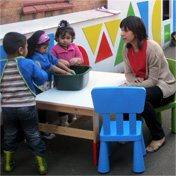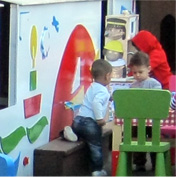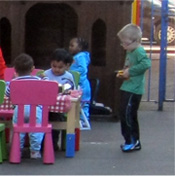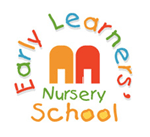01162763377 | enquiries@earlylearnersnurseryschool.co.uk



Health
At Early Learners' Nursery School we have procedures to promote Healthy Eating and aim to provide nutritious food to meet the children's individual dietary needs.
6.5 Food and drink
Policy statement
Our provision regards snack and meal times as an important part of our day. Eating represents a social time for children and adults and helps children to learn about healthy eating. We promote healthy eating using resources and materials from the Pre-school Learning Alliance. At snack and meal times, we aim to provide nutritious food, which meets the children's individual dietary needs.
Procedures
We will follow these procedures to promote healthy eating in our setting.
- Before a child starts to attend the setting, we find out from the parents their children's dietary needs and preferences, including any allergies. (See Managing Children with allergies policy.)
- We record information about each child's dietary needs in his/her registration form and parents sign the record to signify that this is correct.
- We regularly consult with parents to ensure that our records of their dietary needs - including any allergies - are up-to-date. Parents sign the up-dated record to signify that it is correct.
- We display current information about individual children's dietary needs so that all staff and volunteers are fully informed about them.
- We implement systems to ensure that children only receive food and drink that is consistent with their dietary needs and preferences as well as their parents' wishes.
- We plan menus in advance, involving children and parents in the planning.
- We display the menus of meals/snacks for the information of parents.
- We provide nutritious food for all meals and snacks, avoiding large quantities of saturated fat, sugar and salt and artificial additives, preservatives and colourings.
- We include a variety of foods from the four main food groups:
- Meat, fish and protein alternatives
- Dairy foods
- Grains, cereals and starch vegetables; and
- Fruit and vegetables.
- We include food from the diet of each child's cultural backgrounds, providing children with familiar foods and introducing them to new ones.
- We take care not to provide food containing nuts or nut products and especially vigilant where we have a child who has a known allergy to nuts.
- Through discussion with parents and research reading by the staff, we obtain information about the dietary rules of the religious groups to which children and their parents belong, and of vegetarians and vegans and about food allergies. We take account of this information in the provision of food and drinks.
- We provide a vegetarian alternative on days when meat and fish are offered and make every effort to ensure Halal or Kosher food is available for children who require it.
- We require staff to show sensitivity in providing for children's diets and allergies. Staff do not use a child's diet or allergy as a label for the child or make a child feel singled out because of his/her diet or allergy.
- We organise meal and snack times so that they are a social occasion in which children and staff participate.
- We use meal and snack times to help children to develop independence through making choices, serving food and drink and feeding themselves.
- We provide children with utensils that are appropriate for their ages and stages of development and take account of the eating practices in their culture.
- We have fresh drinking water constantly available for the children. We inform the children about how to obtain water and that they can ask for water at any times during the day.
- In accordance with parents' wishes, we offer children arriving early in the morning - and/or staying late an appropriate meal or snack.
- We inform parents who provide food for their children about the storage facilities available in the setting.
- We give parents who provide food for their children information about suitable containers for food.
- In order to protect children with food allergies, we discourage children from sharing and swapping their food with one another.
- For children who drink milk, we provide pasteurised milk. Although we slowly introduce semi-skimmed milk from the age of two years, firstly into meals and dishes, such as on cereal or in white sauces, before being offered as a drink, so that the transition is gradual.
- For each child under two, we provide parents with daily written information about feeding routines, intake and preferences.
Packed Lunches
Where settings cannot provide cooked meals and children are required to bring packed lunches, we
- ensure perishable contents of packed lunches are refrigerated or contain an ice pack to keep food cool;
- inform parents of our policy on healthy eating;
- inform parents of whether we have facilities to microwave cooked food brought from home;
- encourage parents to provide sandwiches with a healthy filling, fruit, and milk based deserts such as yoghurt or crème fraiche where we can only provide cold food from home.
- We discourage sweet drinks and can provide children with water or diluted fresh fruit juice;
- Discourage packed contents that consist largely of crisps, processed foods, sweet drinks and sweet products such as cakes or biscuits. We reserve the right to return this food to the parent as a last resort.
- Provide children, bringing packed lunches, with plates, cups and cutlery; and
- Staff sit with the children to eat their lunch so that the meal time is a social occasion.

